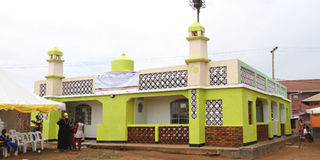Prime
How Muslims fell out with Muteesa I

This small, green painted mosque in Namugongo is all there is in memory of the Muslim martyrs.
PHOTO BY ABUBAKER LUBOWA
What you need to know:
Fallout. Fearing forced conversion by Kabaka Muteesa I, some of those not yet converted sought to show absolute loyalty to the throne. They resorted to making unfounded allegations against the Muslim converts to the kabaka. The allegations included accusing Muslim leaders of having denounced the kabaka, calling him a kaffir and accusing him of eating pork.
Christian martyrs have been celebrated a lot in Uganda and their day is commemorating by hundreds of thousands. Unfortunately, little is said about the close to 100 Muslim martyrs who were killed in Namugongo.
The first martyrs in what came to be called Uganda were killed on the orders of Kabaka Muteesa I. More than 100 were martyred for their Islamic faith while up to 300 others fled the country in Arab caravans to the coast.
Writing in the book Simuda Nyuma, Hamu Mukasa says: “In the country at large, as many as 1,000 Muslim Baganda may have suffered for their faith.”
Ahmed Katumba and F. B. Welbourn, writing in volume 28 of the Uganda Journal of 1964, said: “Muteesa encouraged Islam as part of his political association with the Arabs and with the sultan of Zanzibar.”
The coastal Arab traders had made a profound impact on Muteesa having given him instructions in Islam and in Arabic.
According to a 1953 Luganda publication Ebyafayo ebitonotono ku dinni ya Kiyisiramu by Sheikh Abdullah Sekimwanyi, the grandson of one of the pioneer Muslims, “Muteesa changed his name from the fierce-sounding Mukabya to Muteesa which was more in accord with Islamic ideas of kingship.”
“He ordered mosques to be built throughout the kingdom and read and explained the Quran to his chiefs. Muteesa was so devoted to his new faith that he even encouraged his subjects to pray and greet in the Muslim way and not to eat any meat not killed in the Islamic way. Despite that, he refused to be circumcised.”
Writing in the Chronicles of Uganda of 1984, P. Ashe, a missionary, said: “Muslim martyrdom took place before Stanley’s visit.”
While J. W. Harrison, another missionary, wrote in his 1890 book Mackay of Uganda: “By persecuting the Muslims, Muteesa had put himself in a dangerous dilemma. He had risked the anger of both Egypt and Zanzibar. He would, therefore, be all the more ready to embrace Stanley’s offer of help, with its implied acceptance of Christianity.”
Harrison says: “By the time of publishing of the letter inviting missionaries in London, the news of the Muslim martyrdom was not yet known and in calling for the missionaries Muteesa was looking for protection against the angered Arab Muslims and the Egyptians.”
Fanning the flames
Around 1873, a team of Egyptians visited Muteesa and they were impressed having found Islam being practiced in Buganda.
However, they were not happy on realising that the mosques were built facing westwards instead of eastwards, and for this they blamed the Arabs from Zanzibar.
T. W. Gee in his book A century of Muhammadan Influence in Buganda 1852-1951, wrote: “They asked Muteesa to call a meeting at which they instructed Baganda Muslims never to eat meat killed by an uncircumcised person, and never to be led in prayer by such. Circumcision, they insisted, was central to Islam and an uncircumcised man could not claim leadership in the community.”
The assertion by the Egyptians was like putting fat on fire. Hamu Mukasa in his book went on to say: “Everybody knows that the kabaka led prayers in Lubiri. The Egyptians said this matter was crucial. The Quran forbade the uncircumcised to lead in prayer and this law should be followed in Lubiri.”
“Why, they asked, doesn’t the kabaka follow the text of the Book? The pages answered that the kabaka admitted to no authority but his own and that all Baganda were subject to him. He had supreme authority in his palace and his mosque and none could prevent him if he chose to lead the prayers.”
The Egyptians insisted that Muslims must obey their ruling, saying: “The kabaka’s supreme authority exists in matters of state; but, when it comes to religion that is another matter.”
From this time on, Muslims started absenting themselves from prayers in Lubiri. During prayers they went to pray outside under proper leadership and they started refusing to eat palace meat killed by a non-Muslims.
This kind of preaching set grounds for internal rebellion as it seemed a challenge to Muteesa’s authority.
Fearing forced conversion by the kabaka, some of those not yet converted sought to show absolute loyalty to the throne. Some chiefs and their adherents resorted to making unfounded allegations against the Muslim converts to the kabaka.
Among the allegations included accusing Muslim leaders of having denounced the kabaka because he was not circumcised; calling him a kaffir who could not lead prayers in a mosque and accusing him of eating pork.
Katumba and Welbourn say: “To refuse commands of the kabaka in deference to those of Allah was to court certain death; and, indeed, any of the accusations was sufficiently derogatory to invite persecution.”
These allegations made the kabaka more suspicious of the intentions of the coastal Arabs and the Egyptians.
Mukasa says: “Awono ebigambo ebyo byonna eby’engeri eyo bwe byabeerangowo nga byongera obusungu ku busungu, ngan obusungu bukula.” (Then all the matters of that sort went on adding wrath to wrath until wrath was full).
Having considered the meat in the palace unclean, young Muslims started sneaking out of the palace to the homes of Muslim chiefs to have meals at night. In the process, they also showed off their newly acquired white Muslim wear.
The Muslim pages also started disobeying Muteesa’s orders in the name of following what the Quran was teaching. To Muteesa, this was a rebellion in the making and a challenge to his authority.
T. W. Gee cites an incident that stretched Mutesa to the limit. “Shortly after the pages stopped eating palace meat, Muteesa was in the mosque with a group of pages when three boys entered, well dressed in white tunics and the rest of the boys turned their attention to the new comers,” he writes.
“The kabaka was very angry, got up and walked out. He immediately sent for the katikkiro (prime minister) and they agreed to arrest the boys. Many others working in the homes of the important chiefs were all put under arrest. They were given to Mukajanga who took them to Namugongo for execution.”
Soon after the killing, Muteesa, fearing the British who had come through Egypt and were fighting with Kabalega, sent emissaries to Khedive (the governor of Egypt under Turkish rule) through Charles Gordon, a British colonial administrator, who was in Bunyoro at the time. However, by then the news of the Muslim killings had reached Gordon and he sent Muteesa’s emissaries back.
Writing in the book Colonel Gordon of Central Africa, G. B. Hill says Muteesa sent emissaries with two letters, one for him and another for Khedive.
“He tells me that he’s a Christian. But he sends a Muslim messenger to the Khedive. If he’s a true disciple, why does he kill the Muslims? And what does he mean by saying that he follows the European religion?” Hill quotes as Gordon saying.
“Does he think that nationality and religion are the same? He has killed many of his subjects. Despite his claim to be a disciple, he killed the disciples. That is not religion. I won’t send these mere peasants to carry a message to the Khedive. Tell the Kabaka to send men of worth, who can explain to the Khedive why he killed the Muslims.”
According to Ahmed Katumba and F. B. Welbourn, Muteesa then got torn between allying himself with the Muslims from Egypt or the Christians.
“Perhaps he had seen that the Arabs were no more than a force to be honoured until something better came along. What he wanted was to be kabaka. The persecution took place as a result of insecurity by a man who was not only cruel, but himself terribly insecure,” Katumba and Welbourn write.
The two authors, however, go ahead and make an analysis of the situation surrounding the Muslim martyrdom, observing that: “The story of the Muslim martyrs suggests all too clearly the amount of sheer cheek and bravado which may have been an important contributor to martyrdom. It indicates how dangerous it was not only for the ordinary people, but even for the close favourites of Muteesa to take too many liberties.”
Under attack
To the authors, the king was taking the law into his own hands for the challenge he was facing. “It points to a situation in which not Islam, as such, was under attack, but impertinent young men who had found in Islam the courage to defy their master,” they note.
They, however, go on to ask: “What need did Islam meet which the old paganism and the service of a powerful kabaka were unable to satisfy? What was it which enabled this defiance, without any material hopes and in the possibility of death, in the name of an alien God?”
“The only thing that seems to emerge quite clearly is that, below their bravado, they had found in the new religion a loyalty which, at certain crucial point made it possible for them to defy a master to whom tradition demanded obedience in all things. Because they had found it, Buganda was on the march; and the Christians were to reap the fruit of their discovery.”
First converts
Among those who first converted included relatives of Muteesa’s close confidants and senior palace chiefs. Among the first 30 converts included; Masanganzira, Kalule, Amulane Tuzinde, Buzinde, Bukulum Matembe Balaga, Yusuf Sebakwa, Musa Bitamide, Musitafa Makongo, Adimani Kiwanuka, Abudalazizi Maleku, Abudala Kadiri Kyayambade, Kanganyulo Namwanira Makogoba, Bamutalira, Sudi Jita, Bira, Kigwana,Juma Matembe, Musoke Mugenzi, Muwanga, Nayise, Butugunya, Sebatta, Sekitoleko, Kaggwa Mayengo, Mafembe, Mponyebuwonyi and Ssekiguddeyo.




